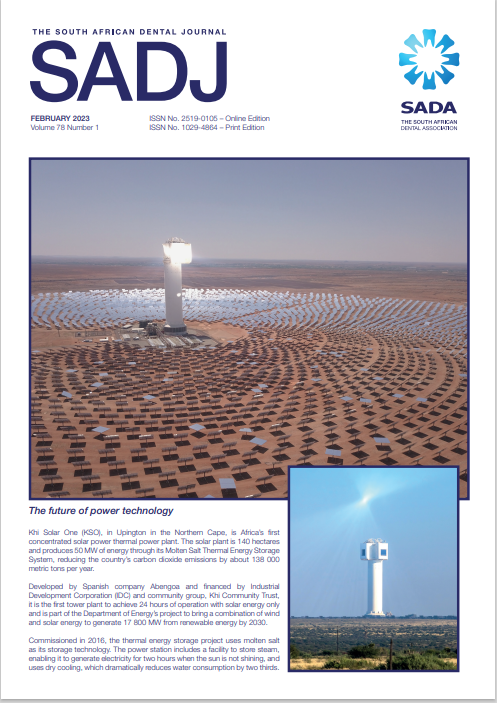The Complexity of Care and the Dunning-Kruger Effect
DOI:
https://doi.org/10.17159/sadj.v78i01.15709Keywords:
radiotherapyAbstract
There appears to be an increase in litigation against general dental practitioners which is increasingly due to clinicians exceeding their competence, because they may not be aware that they lack the required skills: the so called Dunning-Kruger effect. The purpose of this paper is first, to briefly explain the Dunning-Kruger effect, and second, to propose guidelines for dentists confronted with
differing levels of complexity of care, in order to increase practitioners’ awareness of their competence, and by extension, their limitations. An example of complexity levels is given using the discipline of Prosthodontics. It is concluded that there needs to be a revision of the scope of practice for dentistry, which currently provides an “anything goes” approach; a revision of Rule 21 of the Health Professions Council of South Africa, whose provisions need to be more precise as they are currently being ignored; and a revision of the system of providing accreditation for CPD courses and in particular for the presenters and content of those courses
Downloads
References
Kruger J, Dunning D. Unskilled and unaware of it: how difficulties in recognizing one's own incompetence lead to inflated self-assessments. J Pers Soc Psychol. 1999; 77(6): 1121-34. doi: 10.1037//0022-3514.77.6.1121. DOI: https://doi.org/10.1037/0022-3514.77.6.1121
Nisbett RE, Wilson TD. Telling more than we can know: Verbal reports on mental processes. Psych Rev 1977; 84(3): 231-259. Doi 10.1037/0033-295X.84.3.231 DOI: https://doi.org/10.1037/0033-295X.84.3.231
Everson HT, Tobias, S. The ability to estimate knowledge and performance in college: A metacognitive analysis. Instructional Science 1998; 26: 65-79. DOI: https://doi.org/10.1023/A:1003040130125
Dunning D, Johnson K, Ehrlinger J, Kruger J. Why people fail to recognize their own competence. Current Directions in Psychological Science. 2003; 12: 83–87 DOI: https://doi.org/10.1111/1467-8721.01235
Edwards RK, Kellner KR, Sistrom CL, Magyari EJ. Medical student self assessment of performance on an obstetrics and gynecology clerkship. Am J Obstet Gynecol. 2003; 188(4): 1078-82. doi: 10.1067/mob.2003.249. DOI: https://doi.org/10.1067/mob.2003.249
Prasad M, Perrin A, Bezila K, Hoffman S, Kindleberger K, Manturuk K, et al. There must be a reason: Osama, Saddam, and inferred justification. Sociol Inq 2009; 79: 142–162. DOI: https://doi.org/10.1111/j.1475-682X.2009.00280.x
Dunning, D. The Dunning-Kruger effect: On being ignorant of one’s own ignorance. In Olson J, Zanna MP (Eds.), Advances in experimental social psychology 2011; 44: 247–296 New York, NY, Elsevier. DOI: https://doi.org/10.1016/B978-0-12-385522-0.00005-6
Motta M, Callaghan T, Sylvester S. Knowing less but presuming more: DunningKruger effects and the endorsement of anti-vaccine policy attitudes. Soc Sci Med. 2018; 211: 274-281. doi: 10.1016/j.socscimed.2018.06.032. DOI: https://doi.org/10.1016/j.socscimed.2018.06.032
Sheldon OJ, Dunning D, Ames DR. Emotionally unskilled, unaware, and uninterested in learning more: reactions to feedback about deficits in emotional intelligence. J Appl Psychol. 2014; 99(1): 125-37. doi: 10.1037/a0034138. DOI: https://doi.org/10.1037/a0034138
Pennycook G, Ross RM, Koehler DJ, Fugelsang JA. Dunning-Kruger effects in reasoning: Theoretical implications of the failure to recognize incompetence. Psychon Bull Rev. 2017; 24(6): 1774-1784. doi: 10.3758/s13423-017-1242-7. DOI: https://doi.org/10.3758/s13423-017-1242-7
Moles D, McColl E, Tredwin C, Witton W, Burns L. Standards in Dentistry. Faculty of General Dental Practice (UK), London
Downloads
Published
Issue
Section
License

This work is licensed under a Creative Commons Attribution-NonCommercial 4.0 International License.






.png)